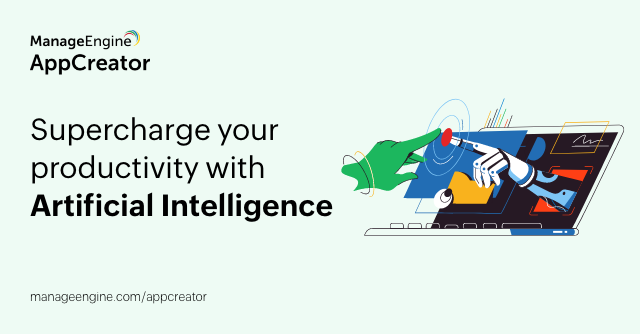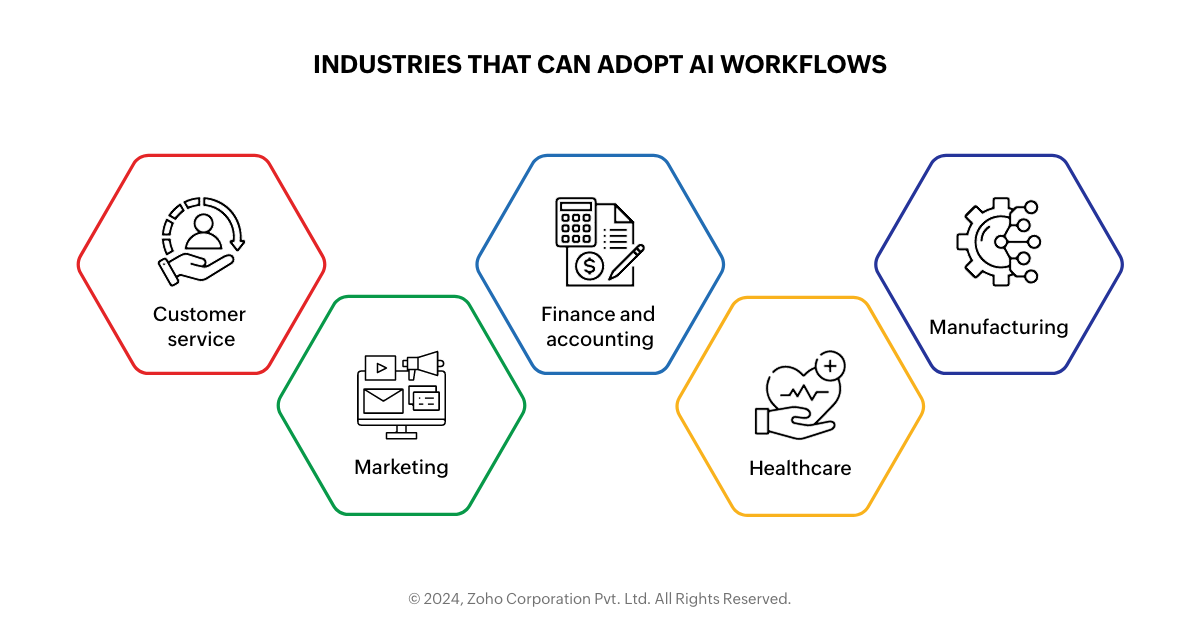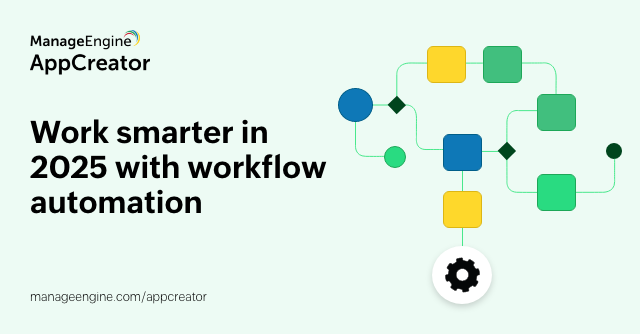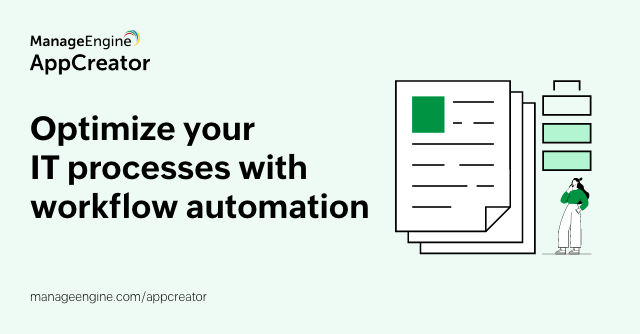- HOME
- Workflow automation
- AI workflows: Supercharge your productivity with artificial intelligence
AI workflows: Supercharge your productivity with artificial intelligence
- Last Updated: May 2, 2024
- 652 Views
- 5 Min Read

Think of your overflowing email inbox. You've developed a system for managing it, but sifting through irrelevant messages and prioritizing tasks can be a time-consuming chore. An AI system can be like a personal assistant for your email. It can automatically categorize emails, flag high-priority messages, and even suggest responses based on past interactions and keywords. This allows you to focus on the most important messages, respond efficiently, and potentially automate repetitive tasks like sending follow-up reminders. The result? A more streamlined workflow, increased productivity, and less time wasted on email drudgery.
This blog will explore how AI workflows can function as the secret weapon in your productivity arsenal. We'll delve into how AI automates repetitive tasks, streamlines processes, and empowers you to make data-driven decisions—all with the goal of propelling you towards peak performance.
What are AI workflows?
Leveraging artificial intelligence (AI) in your workflows helps you streamline and improve repetitive, manual business processes. By integrating AI tools into existing workflows, you can automate tasks, improve efficiency, and free up human resources for more strategic endeavors.
Types of AI workflows
The beauty of AI workflows lies in their versatility. Here are some common types:
Data analysis and processing: AI can sift through massive datasets, identifying patterns, trends, and anomalies that would be difficult for humans to spot. This empowers data-driven decision-making.
Generative AI: This type of AI can create entirely new content, from marketing copy to design elements. It can automate report generation, email drafting, and even code writing.
Machine learning automation: Machine learning algorithms can become attuned to environments and improve over time, automating tasks that require continuous adaptation. This can be applied to fraud detection, risk management, and personalized recommendations.
Predictive analytics: AI can analyze historical data to predict future outcomes. This can be used for sales forecasting, inventory optimization, and preventative maintenance.
Speech AI: Speech recognition and natural language processing enable AI to identify and interact with spoken language. These technologies can be applied in tasks such as automated customer service chatbots or voice-activated helpers.
AI workflow use cases

AI workflows can be applied across various industries and functions. Here are some real-world examples:
Customer service: Chatbots powered by AI can answer customer questions 24/7, reducing wait times and improving satisfaction.
Marketing: AI can personalize marketing campaigns, analyze customer sentiment, and automate social media content creation.
Finance and accounting: AI workflows can automate data entry, generate reports, and detect fraudulent transactions.
Healthcare: AI workflows can analyze medical images, identify potential diseases, and assist doctors in making diagnoses.
Manufacturing: AI can enhance production efficiency, foresee machinery malfunctions, and elevate quality assurance.
Benefits of AI workflows
There are numerous advantages to adopting AI workflows:
Increased efficiency: AI automates repetitive tasks, freeing up human employees to focus on higher-value activities. This can significantly improve productivity and output.
Reduced errors: It is programmed to follow specific instructions, minimizing the chances of human error in data entry, analysis, and decision-making.
Improved accuracy: AI algorithms can analyze vast amounts of data with greater accuracy than humans, leading to more informed decisions and better outcomes.
Cost savings: Automating tasks and reducing errors can lead to significant cost savings in terms of labor, rework, and missed opportunities.
Enhanced customer experience: AI-powered chatbots and virtual assistants can provide 24/7 customer support, improving satisfaction and loyalty.
Data-driven decisions: Artificial intelligence workflows enable real-time data analysis, providing valuable insights to support informed decision-making across all levels of an organization.
Scalability and flexibility: AI workflows can be easily scaled to accommodate changing workloads and business needs. Additionally, they can be adapted to integrate with existing systems and processes.
Challenges of AI workflows
Despite the numerous benefits, implementing AI workflows also presents some challenges:
Cost of implementation: Developing and deploying AI workflows can be expensive, particularly for complex tasks requiring significant data and computational resources.
Data bias: AI algorithms are trained on data sets, and any biases present in that data can be reflected in the AI's outputs. Mitigating data bias is crucial to ensure fair and ethical AI implementation.
Job displacement: As AI automates tasks, some jobs may be lost. However, new opportunities will likely emerge that require human skills such as creativity, critical thinking, and problem-solving.
Explainability and transparency: Understanding how AI models arrive at their decisions can be difficult. This lack of transparency can raise concerns about accountability and trust.
Security and privacy: AI workflows entail dealing with substantial amounts of data, prompting worries about security and privacy. Establishing strong data security measures is crucial.
The future of AI workflows
AI workflows are still evolving, but their potential is undeniable. As AI technology continues to develop, we can expect even more sophisticated workflows that will transform the way we work and live. Here are some exciting possibilities on the horizon:
Integration with the Internet of Things (IoT): AI workflows will likely become seamlessly integrated with IoT devices, enabling real-time automation and intelligent decision-making across various aspects of our lives.
Enhanced human-AI collaboration: The future of work will likely involve a more collaborative approach, where AI handles repetitive tasks and humans focus on strategic decision-making, creative problem-solving, and tasks requiring social and emotional intelligence.
Democratization of AI: Advancements in AI development platforms and cloud computing could make AI workflows more accessible to smaller businesses and individual users. This could lead to a significant increase in AI adoption across various sectors.
Ethical considerations: As AI becomes more sophisticated, ethical considerations will become paramount. Developing and implementing AI workflows responsibly, transparently, and with a focus on human well-being will be crucial.
Are you ready to explore the potential of AI workflows in your organization? Here are some steps you can take:
Identify repetitive tasks: Pinpoint areas in your workflow that are manual, time-consuming, and ripe for automation.
Evaluate AI solutions: Research available AI tools and platforms that can address your specific needs.
Start small: Begin by implementing AI for a pilot project to assess its effectiveness and gain experience.
Focus on human-AI collaboration: Ensure that AI complements your human workforce, not replaces it.
AI workflows offer a powerful opportunity to streamline processes, boost productivity, and gain valuable insights. By understanding the benefits and challenges associated with AI workflows, businesses and individuals can make informed decisions about how to leverage this transformative technology. As AI continues to evolve, embracing AI workflows will be key to staying competitive and thriving in the future.



